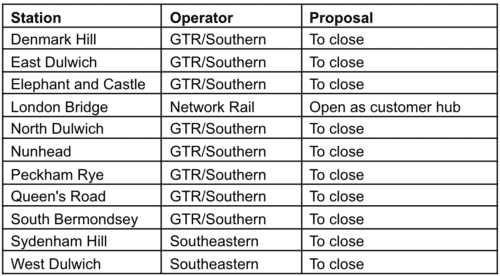Disabled people and local politicians join forces to oppose closure …
Disability campaigners and local politicians have urged rail companies to reconsider plans to close ticket offices at ten of Southwark’s national rail stations.
Under proposals floated by the Rail Delivery Group (RDG), which represents the UK’s major rail companies, only the London Bridge ticket office would remain open.
The RDG’s plans, which would see roughly 1,000 offices close nationally, aim to “modernise” the service. The group says just twelve per cent of rail tickets were sold at ticket offices last year.

But disability charity Scope has warned that disabled people have had “little reassurance that these changes will make our rail network more accessible”.
Canada Water resident Dennis Mitchell, 64, who suffers from mental health problems that affect his ability to read, said: “For me, it [the ticket office] is essential because I can’t read very well so if I was going to have to buy a ticket, I always go to the ticket office.
“I ask what platform it is and they always make you feel better. No way would I be able to use those machines – I wouldn’t be able to read them.”
The RDG began consulting on “plans to modernise customer service across the rail network” in early July.
In Southwark, this would mean closing ticket offices at Denmark Hill, East Dulwich, Elephant and Castle, North Dulwich, Nunhead, Peckham Rye, Queen’s Road, South Bermondsey, Sydenham Hill and West Dulwich stations.

The majority of these stations are run by Govia Thameslink Railway or by its subsidiary Southern. Southeastern operates at Sydenham Hill and West Dulwich stations.
The companies’ proposals mean moving staff out of ticket offices and turning them into customer help staff that rove around the stations and platforms.
The RDG says this would mean “a more visible and accessible staff presence across the network as a whole”.
The changes respond to a “collapse in people using ticket offices” according to the RDG. The group said an estimated 99 per cent of all transactions made at ticket offices last year could be made at Ticket Vending Machines (TVMs) or online.
But local politicians across the political divide are sceptical over whether ticket-buying services will really remain accessible.
Labour’s Peckham Rye councillor Chloe Tomlinson, who recently protested against the changes outside Peckham Rye Station along with other Labour councillors, said rail companies were “putting private profit ahead of what the public actually needs”.
She continued: “Closing ticket offices in Peckham and across the country will downgrade our rail services. This will impact many of us – who doesn’t rely on a ticket office from time to time to get a refund or to ask for advice?”
The Lib Dems’ North Bermondsey councillor Rachel Bentley said: “I’m deeply concerned about how this will impact those with accessibility needs, without access to the internet, or who don’t speak English as their first language.”
In a statement, the Southwark Liberal Democrat Group said ticket offices provided hearing loops for the hard-of-hearing and “a consistent place to go” for people with limited mobility.
“To justify these changes on the grounds of low ticket sales through ticket offices is totally missing the point that those who do use these facilities rely on them,” Cllr Bentley said.
While just twelve per cent of tickets were purchased by ticket offices, the rail union The National Union of Rail, Maritime and Transport Workers (RMT) said this still equated to 180 million journeys.
Louise Rubin, Head of Policy at disability charity Scope, said: “We’ve had little reassurance that these changes will make our rail network more accessible for disabled people. We’re deeply concerned that they will result in more people being stranded without the support they need.
“It’s already far too difficult for disabled people to travel on public transport in this country. We continue to hear of disabled people being left on trains and stranded at stations.”
The consultation deadline was originally planned for July 26 and has been extended to September 1. This was extended following threats of legal action from politicians and disability campaigners over what was regarded an overly short deadline.
Jacqueline Starr, Rail Delivery Group chief executive, said: “Our commitment is that we will always treat our staff, who are hugely valued and integral to the experience our customers have on the railway, fairly, with support and extra training to move into new more engaging roles.
“We also understand that our customers have differing needs, which is why the industry widely sought the views of accessibility and passenger groups when creating these proposals, and will continue to through the consultation.
“We encourage those who wish to take part to go to their local train company website or visit Transport Focus or London Travelwatch.”
Click here to have your say on ticket office closures. [1]
References
- ^ Click here to have your say on ticket office closures. (www.londontravelwatch.org.uk)